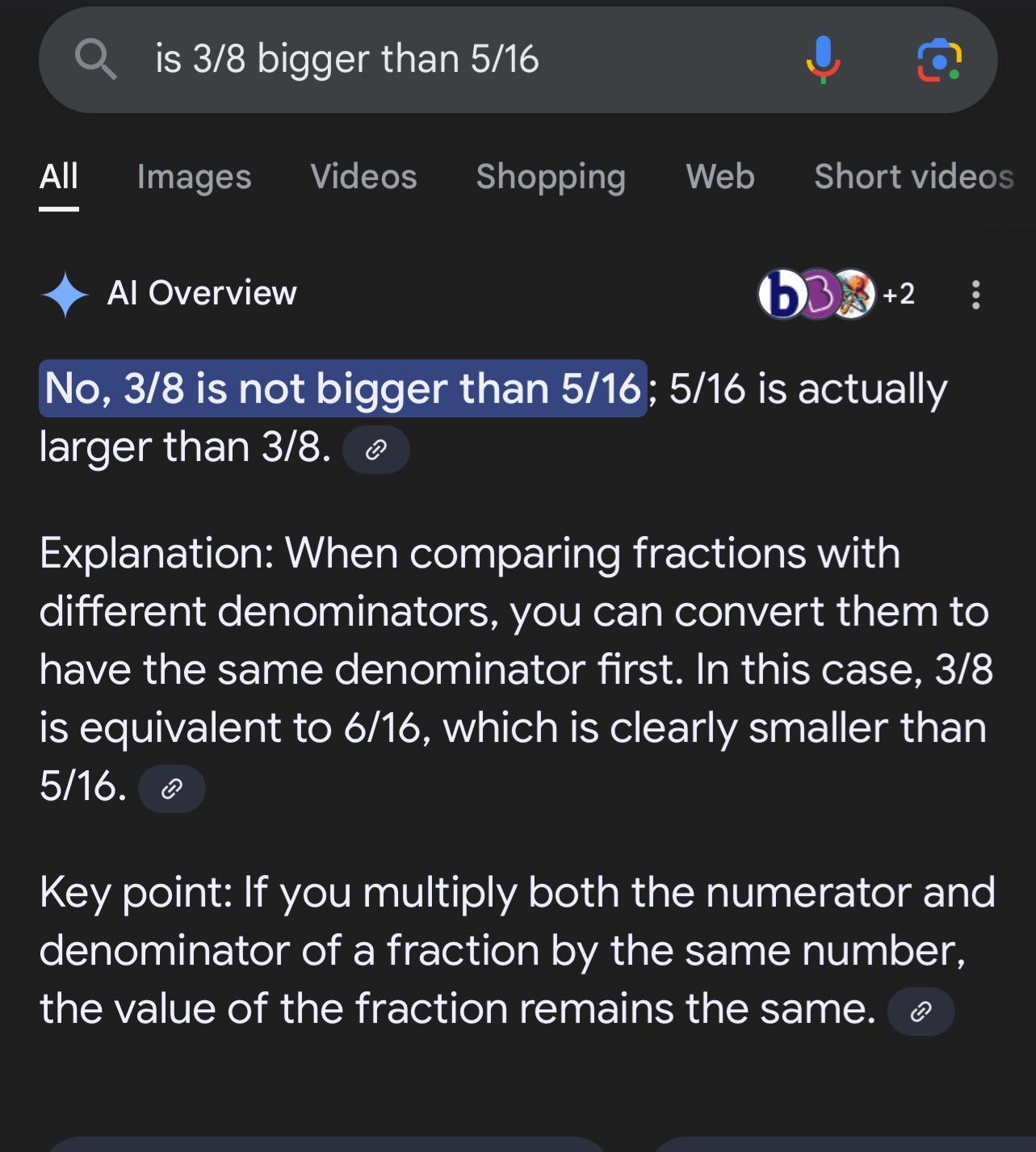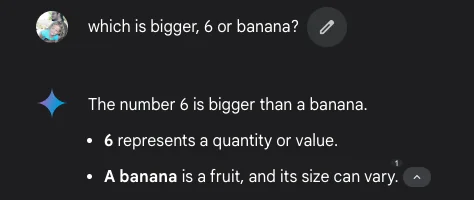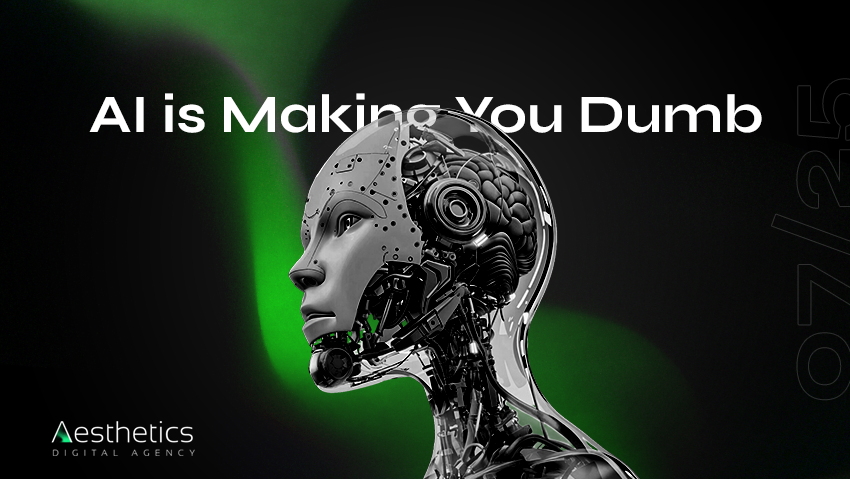In today’s era, search engines are our go-to tools for finding answers to life’s big and small questions. From comparing fractions to finding the right camera lens adapter, we rely on platforms like Google to deliver accurate, trustworthy information.
However, a growing number of Google users are noticing a troubling trend: incorrect AI-generated answers dominating the top of search results.
Google’s AI confidently declared that 3/8 is smaller than 5/16 despite clear mathematical evidence to the contrary!

The Rise of AI in Search Engines
Artificial Intelligence (AI) has become a baseline of modern search engines. Google, Bing, and others have integrated AI to provide quick, conversational answers to user queries. These AI summaries, often displayed at the top of search results, aim to save time by delivering instant answers without requiring users to click through multiple links.
In theory, this is a game-changer. In practice, however, the results can be wildly inaccurate.
Upon searching the same question on DuckGoGo, AI contradicted itself, first claiming that 3/8 is smaller, then providing calculations that proved the opposite, which shows that these systems, “correlation machines,” lack a true understanding. AI’s overconfidence in wrong answers is eroding trust in search engines.
Why AI Gets It Wrong
To understand why AI search results are failing, we need to look under the hood. Most AI models powering search summaries are Large Language Models (LLMs), like those behind ChatGPT or Google’s Gemini. These models are essentially “predictive text on steroids,” as they generate responses based on patterns in their training data, not by reasoning or understanding concepts like a human would.
For example, in the case of comparing 3/8 and 5/16, the AI correctly converted 3/8 to 6/16 but then bizarrely concluded that 6/16 is smaller than 5/16. Why? Because LLMs don’t “think” about numbers as values.
AI converts numbers into tokens and processes them without grasping their actual magnitude. This is why an AI might claim 6 is smaller than 5 or, as humorously noted, struggle to compare 6 to a banana.

This lack of reasoning also explains other absurd errors, like Google’s AI suggesting that a Citicar with a top speed of 28 mph can go from 0-60 in 3 seconds or that diet cola is “high in sugar”.
These aren’t isolated incidents but symptoms of a broader issue that AI prioritizes sounding correct over being correct.
Is AI Making Us Dumb? The Impact On Users
A recent MIT study has provided the first direct neural evidence that reliance on AI tools like ChatGPT can reduce cognitive engagement, memory retention, and brain connectivity during complex tasks such as essay writing. The study, led by MIT Media Lab researchers, monitored brain activity in 54 adults (aged 18–39) from Boston-area universities as they wrote SAT-style essays under three conditions:
- Using ChatGPT (large language model, LLM)
- Using a traditional search engine (e.g., Google)
- Relying solely on their cognitive abilities (“brain-only” group)
Key findings:
- Lowest brain engagement: The ChatGPT group consistently showed the weakest neural connectivity across brain regions associated with creativity, memory, and semantic processing. EEG scans revealed reduced activity in alpha, theta, and delta frequency bands, which are linked to deep thinking and memory integration.
- Cognitive decline over time: Over several months, participants who used ChatGPT became increasingly passive, often resorting to copy-paste behaviors and displaying a decline in critical thinking and originality. Essays from this group were described as more formulaic and generic.
- Poor memory retention: When asked to recall or rewrite their essays without AI, the ChatGPT group struggled to remember their own content, showing a “reset” in memory and weaker brainwave patterns. In contrast, the brain-only group exhibited strong recall and deeper engagement.
- Intermediate effects for search engines: Participants using search engines showed moderate cognitive activity and better memory retention than the AI group, but less than those relying solely on their own thinking. The act of searching and evaluating sources provided more mental stimulation than simply accepting AI-generated text.
- Sense of ownership: The ChatGPT group reported a diminished sense of ownership and satisfaction with their work, while the brain-only group felt more connected and proud of their essays
Why Is This Happening?
Market pressures largely drive the push for AI in search engines. Google’s leadership seems intent on justifying massive AI investments, even at the cost of quality. The company replaced its long-time search leader, who opposed monetization, with someone from the ads department, shifting focus to revenue over reliability.
This explains why sponsored ads and AI summaries often overshadow organic results, forcing users to scroll past irrelevant or incorrect information.

Google itself claims that it can make mistakes and encourages users to double-check. AI’s prominence is fueled by hype. Investors and tech companies are racing to integrate AI, often without rigorous testing, as an AI enthusiast criticized. The result? A “pathetic hallucination answer” on nearly every search, replacing older, more reliable features like Google’s highlighted snippet.
Alternatives and Workarounds To AI Overview
The good news? Users aren’t helpless. Here are some practical solutions Aesthetics Digital found to bypass faulty AI results:
- Use the -ai Flag: “-ai” to your search query to filter out AI-generated summaries. This simple trick can restore more traditional search results.

- Switch Search Engines: Try Bing, which correctly answered that 3/8 is larger than 5/16 with clear references.
- Browser Extensions: Use Firefox with extensions to hide AI results entirely, giving users control over their search experience.
- Scroll Past AI: Simply ignoring AI summaries and scrolling to organic results can yield better answers, though it’s a hassle.
- Double-Check with Primary Sources: For critical queries, like payroll regulations, cross-referencing with reputable websites is advised.
Conclusion
AI highlights a growing pain point as AI search results that are confidently incorrect and point to the Dead Internet Theory. From Google’s math blunders to Bing’s occasional wins, the state of AI in search is a mixed bag. While the technology holds promise, its current implementation often prioritizes flash over substance, leaving users frustrated and misled.
By using workarounds like the -ai flag, switching to alternative engines, or simply scrolling past AI slop, you can reclaim control over your search experience. In an era where “artificial thickness” threatens to overshadow truth, a little skepticism and savvy searching go a long way.







